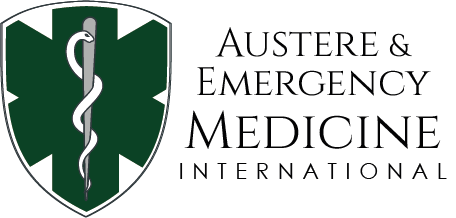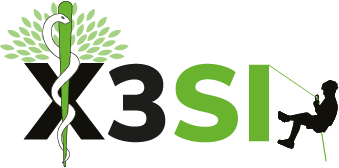Overview
Austere Trauma Response is an intensive and specialized course designed for healthcare professionals seeking to enhance their skills in the swift recognition and management of immediate life threats involving significant trauma in challenging environments.
In this comprehensive program, participants will delve deep into the principles and practices of trauma care, focusing on scenarios that demand rapid, precise, and adaptable interventions. Whether you are a paramedic, nurse, physician, or first responder, this course is tailored to equip you with the expertise needed to deliver high-quality critical care even in austere and resource-limited settings.
Through immersive simulations, hands-on training, and expert-led discussions, you will gain a profound understanding of trauma management including the control of peripheral, junctional, thoracic and abdominal bleeds; the management of amputation and avulsion, blast injuries, pelvic trauma, high-risk burns, rhabdomyolysis and more.
Join us on this educational journey where you will master the art of trauma care in austere environments, ensuring you can make a significant impact in saving lives when every second counts.
Our experienced instructors will guide you through the intricacies of rapid patient assessment, effective communication in high-stress situations, and the utilization of limited resources for optimal outcomes. By the end of this course, you will possess the confidence and skills necessary to navigate critical emergencies with competence and compassion, ensuring that you can provide the highest standard of care, regardless of the challenges posed by the environment.
Introduction to Emergencies in the Austere Context:
Prepare for emergencies in challenging environments. This module provides crucial insights into crisis management in austere settings, emphasizing adaptability and efficient use of limited resources. Participants will gain a deep understanding of the unique challenges posed by austere contexts, ensuring effective and compassionate responses in diverse emergency situations.
Algorithms for the Management of Patients in Extremis in the Austere Context:
Learn advanced strategies for handling critical patients in challenging environments. This module focuses on evidence-based algorithms, enabling healthcare professionals to make rapid, informed decisions when faced with life-threatening situations in austere conditions. Participants will develop expertise in assessing, prioritizing, and managing patients in extremis, ensuring optimal care even in resource-limited settings.
Triage:
Immerse yourself in our comprehensive Triage module, equipping healthcare professionals with essential skills in rapid patient assessment and prioritization during mass casualty incidents. Participants will learn efficient triage techniques, enabling quick categorization of patients based on injury severity. This course empowers participants to make critical decisions under pressure, ensuring optimal resource utilization and timely medical interventions.
Catastrophic Haemorrhage Control:
Gain expertise in managing life-threatening bleeding scenarios. This module covers the latest techniques and tools for controlling severe bleeding, including tourniquet application, wound packing, and hemostatic agents. Participants will practice rapid assessment and proper application of pressure dressings, equipping them to respond swiftly and decisively in emergencies, ultimately saving lives.
Shock:
Explore the complexities of shock management, focusing on early recognition, precise assessment, and prompt intervention strategies to stabilize patients experiencing shock. Participants will refine their skills in fluid resuscitation, vasopressor administration, and advanced monitoring techniques, enhancing their ability to provide immediate and targeted care, significantly improving patient outcomes in critical situations.
Traumatic Amputation, Avulsion, and De-gloving:
Prepare for severe limb injuries with our Traumatic Limb Injuries module, empowering healthcare providers with specialized knowledge and skills. Participants will learn the latest techniques in wound care, tissue preservation, and rapid stabilization, ensuring the best possible outcomes for patients with traumatic amputations, avulsions, and de-gloving injuries.
Master the assessment and management of spine injuries in this specialized module. Participants will learn techniques in rapid assessment, immobilization, and transportation, emphasizing the importance of early recognition and appropriate interventions to prevent secondary injuries and complications.
Enhance your expertise in Pelvic Trauma management, mastering advanced techniques in pelvic stabilization, hemorrhage control, and pain management. Participants will practice effective pelvic binding, arterial embolization, and communication strategies for multidisciplinary trauma teams, ensuring timely and comprehensive interventions.
Blast Injury:
Delve into the intricate world of blast injuries, gaining in-depth knowledge of blast mechanisms, injury patterns, and associated complications. Participants will develop advanced assessment skills, blast-related trauma management techniques, and effective coordination strategies within multidisciplinary trauma teams, ensuring optimal patient outcomes and minimizing long-term complications.
Airway Burns:
Navigate the unique challenges of Airway Burns, gaining advanced knowledge in airway management techniques, inhalation injury assessment, and early intervention strategies specific to burn-related airway complications. Participants will practice airway assessment, intubation procedures, and the use of specialized airway adjuncts, ensuring effective airway management and improving overall outcomes in burn-related emergencies.
Rhabdomyolysis, Crush Injury, and Harness Hang Syndrome:
Gain comprehensive knowledge and skills in managing rhabdomyolysis, crush injuries, and harness hang syndrome. Participants will learn advanced techniques in rapid assessment, fluid resuscitation, and pain management specific to these conditions. Through hands-on workshops and simulation scenarios, learners will practice meticulous monitoring, early intervention strategies, and effective communication within multidisciplinary teams. By mastering these critical skills, participants will be well-prepared to provide timely and targeted care, significantly improving patient outcomes in cases of rhabdomyolysis, crush injuries, and harness hang syndrome.
Fall From Height:
Explore the complexities of managing injuries resulting from falls from height in this specialized module. Participants will delve into assessment techniques, injury patterns, and associated complications specific to falls from height incidents. Through immersive lectures and practical simulations, learners will develop advanced assessment skills, injury stabilization techniques, and effective coordination strategies within trauma teams. By mastering the intricacies of managing fall-related injuries, healthcare providers will be equipped to address the unique challenges posed by these incidents, ensuring optimal patient outcomes and minimizing long-term complications.
Certification
Upon successful completion of this course, participants receive a certificate of completion from Austere & Emergency Medicine International, valid for three years. Participants who complete all four modules (ACC, ATR, AMR, AER) will receive Austere Medic Certification.

Recertification
Eligible graduates from other recognized wilderness or austere medical schools may recertify their WEMT with this course. Candidates wishing to upgrade from WEMT to Austere Medic must complete all four modules (ACC. ATR, AMR, AER).
Candidates wishing to recertify must have a current WEMT (unexpired or within the grace period of the issuing school) earned in one of the following course types:
- A recognized WEMT, WEMS or AM course with a minimum of 45 hours of in-person instruction.
- An eligible recertification course with a minimum of 24 hours of in-person instruction.
Candidates wishing to recertify an Austere Medic must ensure that they have completed all four modules within the last 36 months.
Location & Logistics
We meet each morning at 0800 and you will be dismissed by 1830. Much of the course takes place outdoors, in various locations within a 30-minute radius of the training centre, so please do not be late.
AccomodationThere are various hotels within a 20-minute grab/taxi ride of the training centre, ranging from 4-star business hotels to 2-star budget hotels. Please remember that you get what you pay for, and the hotels are not owned or operated by X3SI. Previous students have stayed in hotels including: Four Points Sheraton, Puchong (further away, nicer, more expensive), Hilton Garden Inn (value for money), and M-Design, Hazzana, OYO502, and Puchong Business hotel (nearby and cheap).
Catering
The advertised course cost includes lunches, coffee, and tea daily. Breakfast and dinner are not included.
What to bring
Participants should bring notepad and pen.
Those attending should wear sturdy, closed toe shoes, bring raincoat and clothes that are ok to get wet/dirty/ripped/stained.
Participants will also require an internet connected device to complete the exam on day three.
Enroll Now
Ready to Elevate Your Expertise?
Enroll in this program and stay at the forefront of emergency medicine. Acquire in-depth knowledge, refine your skills, and achieve mastery in managing emergencies in austere environments. Invest in your professional development and make a significant impact on patient outcomes.
Partial scholarships and bursaries are available on this course. For more information:
https://aemed.net/sponsorship/
